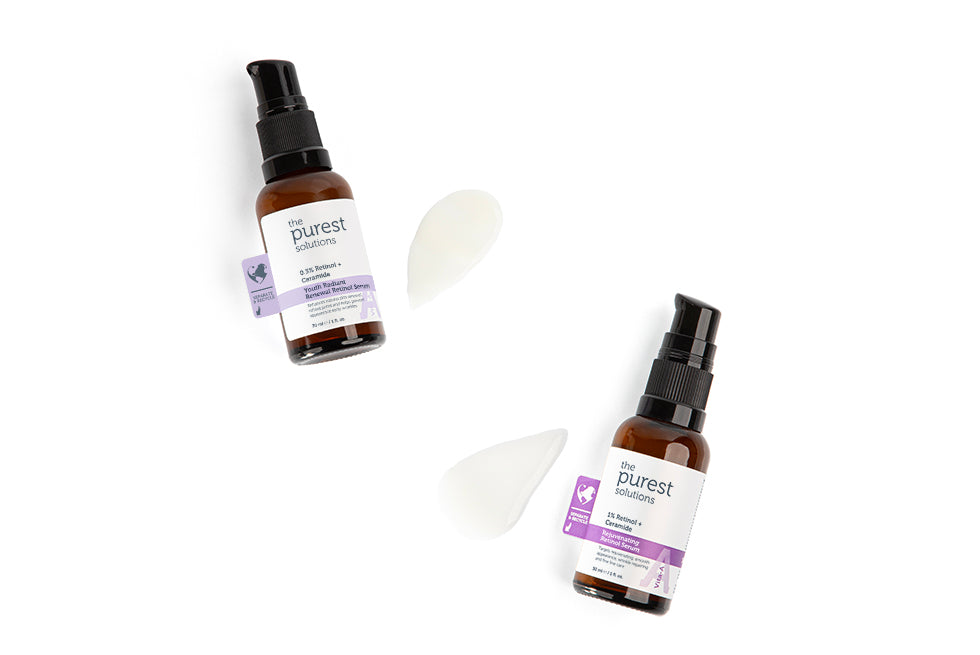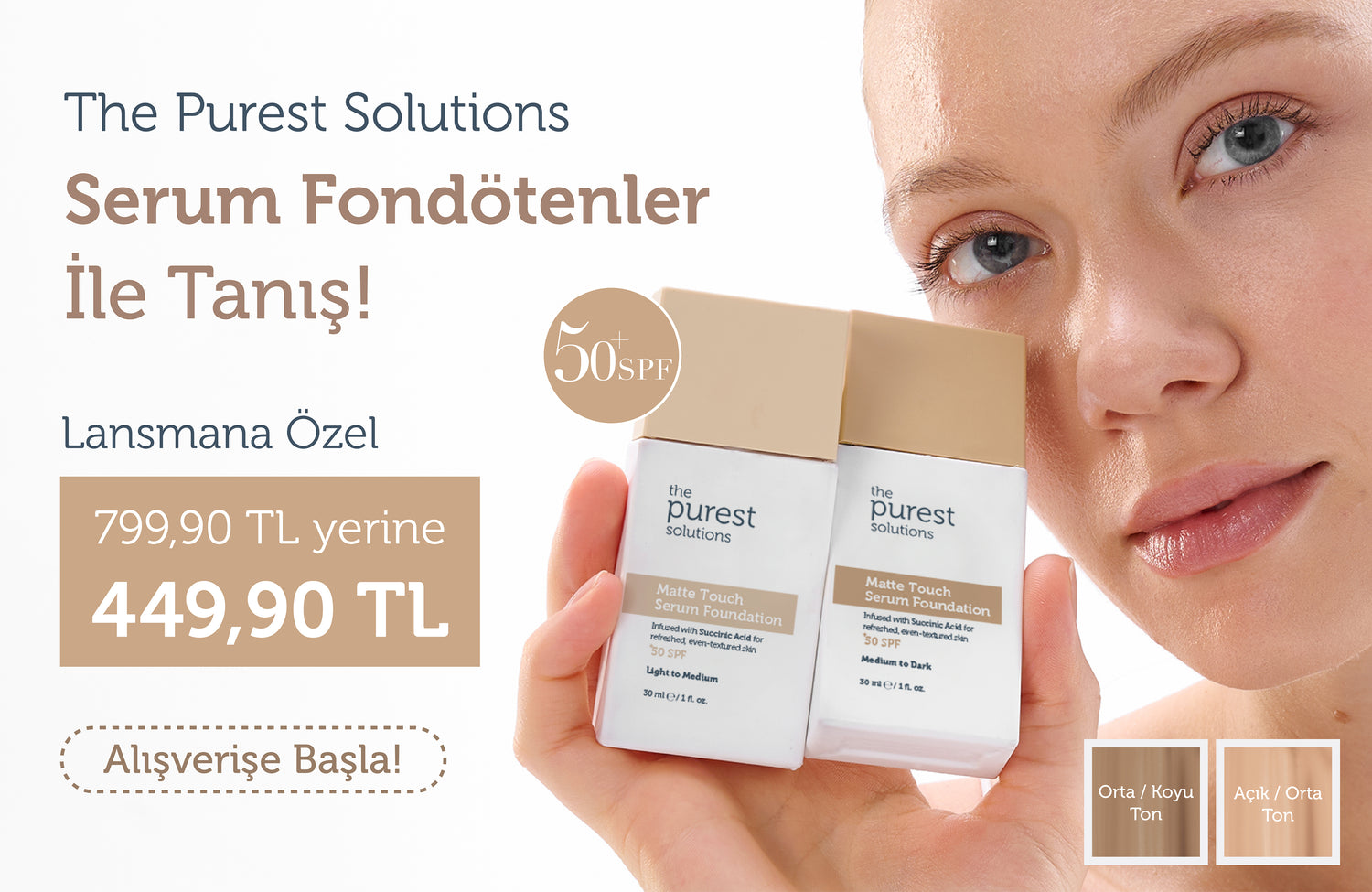Retinol has become an indispensable part of young skin care routines in recent years, especially with its anti-aging effect. An effective ingredient to prevent fine lines, loss of elasticity and wrinkles on the skin, retinol can provide long-term benefits when used at a young age against signs of premature aging. Although young skin often experiences fewer signs of premature aging, using retinol at an early age not only slows down the aging process but also supports the skin to look smoother, healthier and younger in the future.
In addition, retinol not only prevents signs of aging, but also combats common skin concerns like acne and uneven skin tone, making it a popular choice for younger ages. However, gentler formulas should be preferred for those with more sensitive and delicate skin. So, at what age should you start using retinol for younger skin, and which products and usage recommendations are best suited? Here’s what you need to know about how to use retinol according to your skin type and age.
What is retinol?
Retinol, a derivative of vitamin A, is one of the most widely used active ingredients in anti-aging skin care. Known for its anti-aging effects , retinol helps skin cells regenerate, reducing the appearance of fine lines and wrinkles. By helping skin cells regenerate, it supports a healthy skin appearance.
In addition, retinol helps to provide a healthier and younger skin appearance by increasing collagen production in the skin. For more detailed information about retinol, you can check out our blog What is Retinol, What Does It Do? Best Retinol Serums .
What skin types are suitable for Retinol? Can sensitive skin types use it?
Although retinol is suitable for almost every skin type, there are some points to consider, especially for sensitive skin.
In oily skin , Retinol helps balance excess oil production and prevents acne formation. It can be used on oily skin, especially thanks to its ability to balance excess sebum. It also cleans and tightens the pores on the skin, which provides a smooth appearance on oily skin. In combination skin , retinol can be used more in the T-zone (forehead, nose, chin). While controlling excess oil in these areas, dry areas should also be treated gently.
Using retinol for dry skin requires a little more caution in the beginning. Because retinol can cause dryness and peeling on the skin, it should be supported with a moisturizer suitable for the skin after the retinol step.
Sensitive skin should be more careful when using retinol. Retinol can cause irritation, redness and peeling on sensitive skin. Therefore, it is important for people with sensitive skin to prefer lower concentration products before starting retinol and to slowly get used to the product on their skin. You can start with 1-2 times a week and increase the frequency of application over time. After night use, you should definitely support the moisturizer with a cream. In addition, since retinol can increase the skin's sensitivity to the sun, it is also necessary to use a high protection factor sunscreen.
If you are looking for a Retinol that can be used on sensitive skin, the Regenerating and Anti-Aging Liposomal Retinol Night Serum may be the right product for your skin. Thanks to its 0.3% cold concentration, it provides a gentler effect and is suitable for people whose skin is easily irritated.
At What Age Can You Start Using Retinol?
Retinol serum, which stands out with its anti-aging effect, is a product that is usually used after the age of 30-40. Because around this age, collagen production in the skin begins to slow down and fine lines and decreased skin elasticity can be seen. However, adding retinol to skin care at an early age can be beneficial in terms of maintaining skin health and preventing signs of aging in the long term.
Retinol can also be an effective option for young individuals who struggle with problems such as acne and skin tone inequalities. When starting to use retinol, it is important to start with low concentration products and use them by acclimating the skin. Retinol can provide different benefits for skin of different ages.
20s : Retinol is often used to treat acne in young skin types. If you have acne, blackheads or pore problems, you can use low-concentration retinol products a few times a week. It can also help prevent signs of premature aging with its skin renewal, barrier repair and collagen production boosting effects.
Ages 30 : At this age, fine lines and loss of elasticity begin to appear on the skin. Retinol helps prevent signs of aging by increasing collagen production in the skin. Using retinol a few times a week can help even out skin tone and reduce the appearance of fine lines.
Age 40 and Beyond : Especially in your 40s and beyond, more visible wrinkles, age spots and fine lines appear on the skin. Highly concentrated retinol products can be used, but since the skin may be sensitive, it should be started slowly. It is also very important to use moisturizers and sunscreen.
Things to Consider When Using Retinol According to Age
Retinol is a powerful ingredient that targets different skin needs depending on age. However, it should be used correctly and with the right steps at every age. Here are the things to consider when using retinol:
Low Concentration at the Beginning: For beginners, low concentration retinol products should be preferred. Over time, as the skin gets used to it, higher concentration products can be used.
Night Use: Retinol is a more suitable ingredient for night use because the skin renews itself during the night, so its effect on the skin is stronger during the night. Our skin's sensitivity to the sun may increase when using retinol. A sunscreen with a high SPF should definitely be used during the day.
Start Slowly: When incorporating retinol into your skin care routine, apply it 2-3 times a week at first, then increase the frequency of use as your skin gets used to it.
Use Moisturizer: The retinol process can cause dryness and peeling of the skin. Therefore, applying moisturizer after using retinol helps soothe the skin.
Ranking of Retinol in Your Skin Care Routine
In skin care, retinol can provide effective results when applied in the right order and in a way that suits your skin type. Especially if you are new to retinol and do not know the order in which to use it or if you have sensitive skin, you can use methods such as the retinol sandwich technique to prevent skin irritation. This technique protects the skin barrier while reducing the risk of irritation from retinol. Here is the correct application order of retinol and the retinol sandwich technique :
Cleanse: Use a gentle cleanser to remove makeup, dirt, and excess oil from skin before applying retinol. Skin should be completely clean and dry, as damp skin can increase the risk of retinol irritation.
Moisturizer (First Layer): For the sandwich technique, apply a thin layer of a moisturizer before applying retinol. This step slows down the effects of retinol, reducing irritation on the skin. Moisturizers containing ceramides, hyaluronic acid, or niacinamide are suitable for this step.
Retinol Application: After the first layer of moisturizer is completely absorbed, take your retinol product and gently apply it to your face. Avoid sensitive areas (eye area, nose, lip area). Apply retinol only to areas where it is needed. If your signs of aging are more advanced and your skin is used to higher concentration retinols, you can use the 1% Repair Retinol Night Serum . If you are 20+ years younger and have sensitive skin or are just starting to use retinol, the 0.3% Retinol Serum may be a more suitable choice for your skin.
Moisturizer (Second Layer): After applying retinol, create a final layer by using a moisturizer again . This will provide an extra barrier on your skin, minimizing the possibility of irritation and preventing moisture loss from the skin.
Sunscreen in Your Daytime Routine: Since retinol makes your skin sensitive to the sun, be sure to use a high-factor sunscreen in your morning routine. Sunscreen supports the effects of retinol by protecting your skin from harmful UV rays.
The Retinol Sandwich technique is especially recommended for sensitive skin or those who are new to using retinol. With regular use, you can stop this method and switch to direct application as your skin gets used to it.
Retinol Product Suitable for Beginners and Sensitive Skin: Youth Radiant Renewal Retinol Serum
The Purest Solutions Liposomal Retinol Night Serum has been specially developed for those who are new to retinol use and for those with younger and more sensitive skin. Its 0.3% Retinol content is gentle on the skin while offering a lower risk of side effects for sensitive skin. Aiming to reduce skin tone inequalities and signs of aging, this serum is a safe option for sensitive and reactive skin. It can be applied comfortably in all seasons when used with sun protection and provides a smoother, healthier and more balanced skin appearance with regular use.
Youth Radiant Renewal Retinol Serum Product Content:
Retinol serum aims to protect and improve skin health while providing gentle care even for sensitive skin with effective ingredient combinations. This special formula supports the skin's natural structure, helps reduce signs of aging and renew skin texture.
Liposomal Retinol: Increases collagen production, improves fine wrinkles and renews skin texture. Provides a gentle effect with its low concentration for sensitive skin.
Acetyl Hexapeptide-8: Prevents wrinkle formation, increases skin elasticity and supports collagen synthesis.
Ceramide: Strengthens the skin barrier, prevents moisture loss and supports the skin's natural protection mechanism.
Ethyl Ascorbic Acid: Works as a powerful antioxidant, reduces pigmentation irregularities and evens out skin tone.
What Products Can and Should Not Be Used With Retinol?
Although retinol is a widely used ingredient for its skin-renewing and anti-aging effects, it can cause irritation or sensitivity if not combined with the right products. In order to support skin health and see the best effects of retinol, care should be taken with which products it can be used.
Available Products:
- Hyaluronic Acid: Retinol use can cause dryness in the skin. Products containing hyaluronic acid help balance these effects by increasing the skin's moisture level.
- Ceramides: Products containing ceramides reduce the sensitizing effects of retinol and strengthen the skin barrier, making the skin more resilient.
- Peptides: Peptides in skincare support the skin's natural repair mechanisms and enhance the anti-aging effects of retinol.
- Sunscreen: Skin that uses retinol becomes more sensitive to the sun. It is essential to use a broad-spectrum sunscreen daily to protect your skin from UV rays .
Products That Should Not Be Used:
- AHA and BHA Acids: These exfoliating acids can increase the risk of further irritation when used with retinol. Therefore, it is recommended not to use them in the same routine.
- Vitamin C (Ascorbic Acid): Vitamin C products should not be used at the same time as retinol, as it can sensitize the skin due to its acidic structure. You can benefit from these two powerful ingredients in your routine by applying vitamin C in the morning and retinol in the evening.
- Physical Exfoliators: Peeling granulated products can irritate the skin. Retinol is an ingredient that can cause peeling and dryness in the first stage. Using it in the same routine with peeling products can increase the side effects of retinol.
You can maximize the benefits of retinol by paying attention to these combinations when creating your skin care routine. It is important to consult a dermatologist if you experience any unexpected reactions on your skin.





